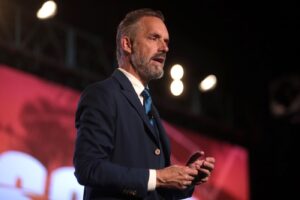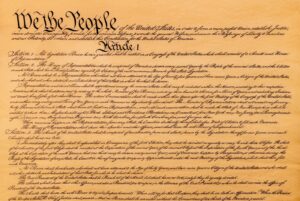Years ago, there was a television show called Dragnet. In this popular drama, which largely reenacted real life events, Sergeant Joe Friday would often say, “Just the facts, ma’am, just the facts.” In today’s public schools, it appears that teachers often ask for the opposite: “Just your opinion, child, just your opinion.” In a public school system that emphasizes the subjective over the objective and opinion over fact, it is no wonder that so many American students lack basic knowledge and yet have opinions galore.
According to the National Assessment of Educational Progress (NAEP), the nation’s chief test of student achievement, American students score lower in history than any other subject, and their test scores have been declining. On the history test for fourth graders, only 9 percent of students could identify a picture of Abraham Lincoln and give two reasons why he was an important figure. Most twelfth grade students did not know the main ideas and purposes of the Declaration of Independence and the Constitution. Meanwhile, recent data indicate that SAT verbal scores have reached an all-time low.
Most high school students do not realize China’s role in the Cold War and most have little overall knowledge of the Cold War. This is especially disturbing because many historians are asserting that the Ukrainian crisis has led us into Cold War II. Moreover, former Soviet Premier Mikhail Gorbachev declared to Time Magazine that the United States and Russia have already entered into a second Cold War over the past few months.
Veritas and Virtue in Education
Start your day with Public Discourse
Sign up and get our daily essays sent straight to your inbox.Jesus famously declared, “You will know the truth and the truth will set you free.” The Ivy League universities were founded on this principle. The Puritans, who founded Harvard in 1636, believed that the quest for truth did not end in the spiritual realm. Rather, they believed that Christ’s assertion applied to all of life, demanding an attitude of both intellectual and academic vigor. This is why, from the 1600s through the 1800s, the nation’s most prominent universities placed such an emphasis on educating ministers. It was the common belief of the time that for the good of society, the most wise and virtuous people should also be the most learned. This conviction is reflected in the mottos of seven of the eight Ivy League universities and those of many other colleges and universities founded at the time. Harvard University’s motto is “truth,” and the crest bearing that declaration (“veritas”) even appears on its football uniforms. Yale University’s motto is “light and truth,” Columbia’s is “In Thy light shall we see light” and Penn’s is “Laws without morals are useless.”
Past American leaders were not alone in their belief in the importance of truth, nor are they the only ones to argue that, for the health of society, virtuous people should be the most learned. Nearly 2,000 years apart, Cicero and Martin Luther King Jr. came to the same conclusion: The most dangerous people on earth are those who are educated or intelligent, but are not virtuous.
In contemporary American society, however, truth is regarded as a four-letter word. Truth has been relegated to a secondary position in the nation’s public schools, universities, political forums, and public squares. Instead, diversity and subjective opinion have been elevated to a higher place of prominence. Diversity of views is often a valuable thing, but it should not be elevated so highly that facts are denied. A more balanced and intelligent view of diversity is needed.
If one esteems diversity too highly, at the expense of creating consensus and pursuing truth, then many of the essential building blocks of a functioning society will be undermined, which may lead to chronic social division. Consensus is attainable consistently only in a nation that actively pursues truth. Diverse viewpoints can help us to see truths that we may have otherwise overlooked, yet truth-based consensus is a far more reliable and worthy goal than the simple existence of diversity.
Truth and Facts
To many, truth is only of value if it is convenient and supports one’s ideology. Over a decade ago, I coined the term “defactualization” to describe societies in which facts are either habitually denied or ignored due to an emphasis on subjectivity. In my view, defactualization is quickly becoming one of the greatest crises of modern times.
Many Westerners are increasingly denying biological and historical facts. Numerous Americans call life in the womb not life. Laws are being passed in some states that assert that it does not matter what sex you are; what matters is the gender that you say you are.
Regarding historical facts, there is of course some room for differences in interpretation. Nevertheless, history is made up of facts that cannot be denied, from the Holocaust to Islamic military expansionism in the 700s AD to the bombing of Pearl Harbor. However, whatever one’s view of abortion’s moral status, a child is not an extension of his or her mother’s flesh. The child has his or her own unique DNA. That is a fact. Any debate about abortion that denies that reality succumbs to the quagmire of defactualization.
Any debate about why President Truman chose to have the atomic bomb dropped on Japan and not Germany must address the fact that the Germans surrendered in early May of 1945, well before the atomic bomb was developed and tested in New Mexico in July 1945. The purpose of this statement is not to claim that Truman was right to drop the bomb on Hiroshima and Nagasaki. The point is this: Facts have to be an important component of any intelligible debate. Different perspectives will always exist, but opinions do not negate facts.
The Danger of Education without Facts
In thousands of public schools in the United States and Western Europe, defactualization is expanding exponentially. This trend should be called what it is: a modern form of anti-intellectualism. In this type of environment, those with the facts behind them often do not prevail. Instead, debates are won by those with the loudest mouths and the Machiavellian ability to manipulate the emotions of others. As a result, the vast majority of students at both the high school and university level hold views based on a dearth of evidence and a plethora of biased opinions.
Truth sets both individuals and nations free, because basing one’s life on truth and facts creates unity and agreement. Differing opinions are fine—in fact, they are a healthy part of living in a democratic society. However, opinions must be based on facts. The defactualization of our public schools and universities undermines the strength of American democracy. As Thomas Jefferson warned, “A properly functioning democracy depends on an informed electorate.” Currently, those who have opinions with a dearth of facts are seeking to intimidate those who value truth.
Many professors present a terribly incomplete view of the world. They present wrongs committed by the United States with a biased anti-American tone and frequently eschew examining the plethora of injustices committed by a variety of nations, under the banner that to do so would be politically incorrect. Sadly, however, this has created a learning environment in which students are taught to be more concerned about what is politically correct than what is factually correct.
The egregious acts of leaders of the far left, particularly socialist and communist leaders, are often overlooked or understated. Many historians regard Mao Zedong as the foremost mass murderer in history, yet many college professors whitewash his ruthlessness. Joseph Stalin’s regime is thought to have caused twenty to forty million deaths, second only to Mao’s regime. Here again, few American students are adequately informed about the horrors perpetrated by foreign dictators.
Many college professors believe it is somehow acceptable to cover up salient features of people’s lives. For example, many sociology professors lionize Margaret Sanger (1883-1966), the founder of Planned Parenthood. It is clear from her own words that she wanted to limit the number of people of color in the United States via abortion and other means. She was undeniably a racist and eugenicist, who had little or no compassion for immigrants. Yet alarmingly few high school and college students know this.
Sensitivity is clearly needed when discussing certain issues. That is love. However, the use of political correctness to deny facts is the opposite of sensitivity.
Parents and children alike are looking for environments in which facts still matter. Opinions count, because people and their experiences count, but they do not change facts. The temptation to be politically correct at the expense of accuracy is nothing new, but it is a temptation that must be resisted if we hope to give our children a strong education.













